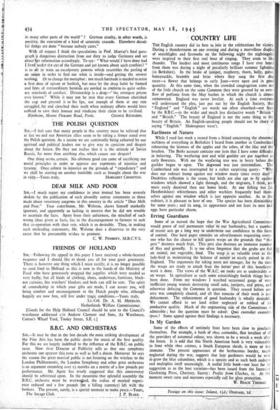' COUNTRY LIFE
THE English country did its best to join in the celebrations for victory. During a thunderstorm on one evening and during a marvellous display of searchlights and fireworks on the following night the nightingales were inspired to their first real bOut of singing. They seem to like thunder. The loudest and most continuous songs I have ever heard from them was during a night of peculiarly brilliant summer lightning (in Berkshire). In the brake of juniper, raspberry, thorn, holly, gorse, honeysuckle, bramble and briar where they sang the first -dog roses—a flower that belongs to early June—were open and in good quantity. •At this same time, when the crowded congregation came out of the little church on the same Common they were greeted by an over- flow of perfume from the May bushes in which the church is almost embowered. England was never lovelier. At such a time everyone will 'understand the plea, just put out by the English Society, that " England " and "English " are words too often absorbed—not /east by the B.B.C.—in the wider and much less distinctive words " Britain " and " British." The beauty of England is not the same thing as the beauty of Britain. An English-speaking people should not be char); of saying " English." Shakespeare wasn't.
Earliness of Nature
While I read last week a record from a friend concerning the abnormal
earliness of everything in Berkshire I heard from another in Cumberland rehearsing the lateness of the apples and the ashes, of the. lilac and the bracken. The Berks account contains one item that I have some difficulty in believing. The -wayfaring tree and wild guelder are put rogetheti, as early flowerers. With me the wayfaring tree was in berry before the guelder began to open. The dogwood was just intermediate. 'he Cutfiberland tale was interrupted by a rather surprising query: " Why does our redstart bump against our window many times every day? " Dmibtless reflection is the cause, but birds are also apt to fly against windows which showed , a light through, and the migranta,. I think,. are more easily deceived than our home birds. At one fishing but (in Herefordshire) whitethroats and other warblers frequently- hurl them- selves against one window which is just opposite another. As to the redstart, it is pleasant to hear of one. The species has been diminishing for some years ; and its song, its appearance and not least its nest 'find eggs have particular charm.
Erring Guardians Some of us nursed the hope that the War Agricultural Committees would prove of real permanent value- to our husbandry, but a number of recent acts go a long way to undermine our confidence in this form of control. One local paper contains an advertisement requesting every- one who has the chalice to kill queen wasps on the grounds that " this pest " destroys much fruit. This pest also destroys an immense number of flies and greenfly. It is too often forgotten that the ,grubs . are -fed on' animal, not vegetable, fond. The wasp is as valuable even as the lady-bird in maintaining the balance of nature so nicely poised in this England. The arguments for taking nests -are stronger, for by the time the wasps are ready to attack frsit the better' part of this beneficent work is done. The views of the W.A.C. on rooks are as undesirable as on wasps. In agriculture as such some' astonishingly foolish things. have been done. From my windows I watched 'occasional gangs of very inefficient young women destroying small oaks; junipers, and gorse, and otherwise defacing the Common in question. They ceased before any area was completely cleared, and all that remains of their work is jtt.• defacement. The enforcement of good husbandry is wholly desirable. We cannot afford to see land either neglected or robbed of hi productive quality. Much of the engineering side of the Committees is admirable ; but the question must be asked: Quis custodies custodes ipsos? Some appeal against their findings is necessary.
In My Garden Some of the effects of untimely frost have been slow to proclaim themselves. For example, a bush of Thus cotinoides, that loveliest of all the providers of autumnal colour, was shown to be a wreck a week after the frosts. It is odd that this North American bush is very 'vulnerable to frost while rhos cotinus, a South European shrub, is more of less immune. The present appearance of the herbaceous _border, much neglected during the war, suggests that lazy gardeners would be wise to grow the blue columbine, which is a species and as such both endures and multiplies itself unceasingly. A useful little book—not least for its suggestion as to the best varieties—has been issued from the Intensive Gardening Press, Chertsey, Surrey: Profits from Cloches, is. At the moment sweet corn and marrows especially call for glass protection.
• W. BEACH THOMAS.
Postage on this issue: Inland, rid.; Overseas, id.:


























 Previous page
Previous page